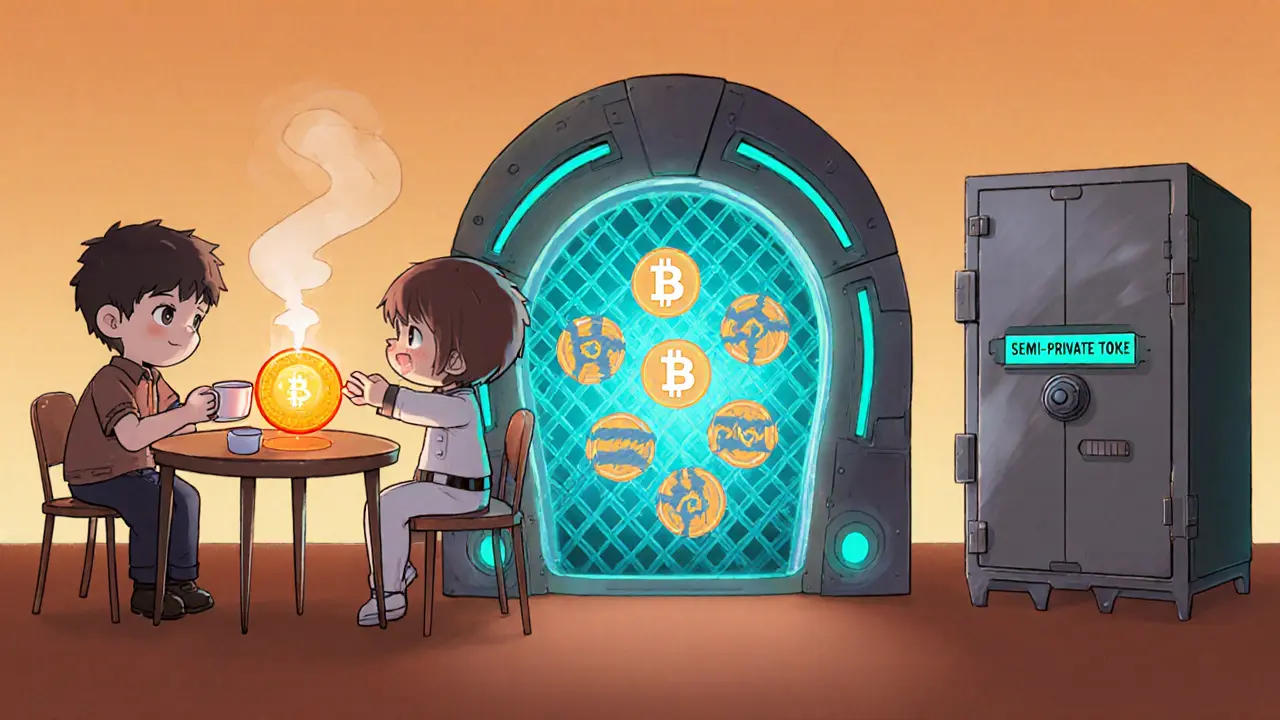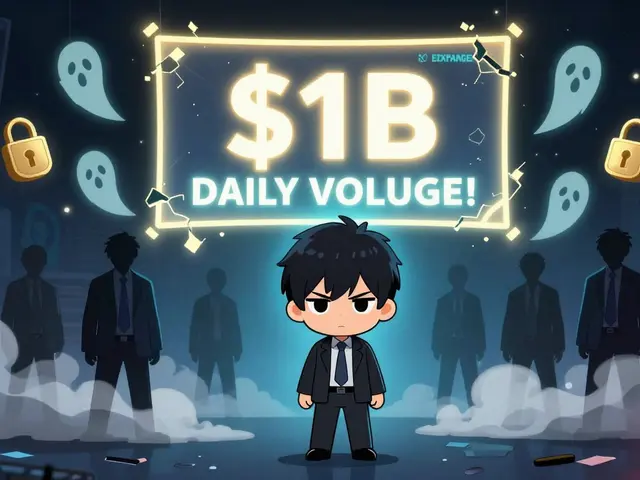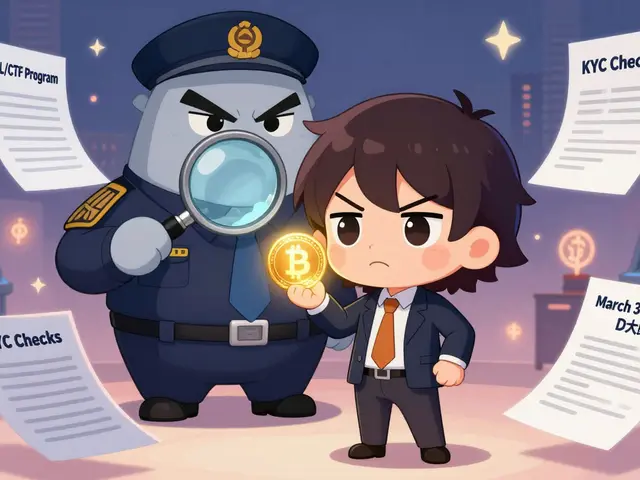Privacy Coin Workaround Comparison Tool
Australia's crypto exchange ban on privacy coins has created trading challenges for Monero (XMR), Zcash (ZEC), and Dash (DASH). This tool compares different workarounds to help you make informed decisions about trading privacy coins while staying compliant.
Your Preferences
Workaround Comparison
| Workaround | Counter-Party Risk | Cost | Legal Implications | Ease of Use | Liquidity |
|---|---|---|---|---|---|
| Peer-to-Peer (P2P) LocalMonero, Bisq |
High | $0.5-3.0% | High | ||
| Offshore Exchanges Binance, Kraken |
Medium | $0.1-0.5% | High | ||
| Decentralized Exchanges Uniswap, SushiSwap |
Medium | $0.3-1.5% | Medium | ||
| Hybrid Custody Swiss Custodians |
Low | $5-50/month | Low |
Based on your preferences, we recommend: None selected
Australia isn’t shutting down the whole crypto market, but its exchanges have effectively drawn a line in the sand for privacy coins. If you own a Monero or Zcash token and you live down under, you’ll soon discover that swapping, selling, or even buying through a licensed platform is nearly impossible. This article walks through the why, how, and what‑next of the crackdown, and it offers practical tips for anyone who still wants to keep their privacy‑focused assets.
Why the Ban Matters
Privacy coins aren’t just another line‑item on a portfolio; they use cryptography that hides who sent what to whom. While that sounds appealing for legitimate privacy, regulators see it as a blind spot for money‑laundering detection. In 2025, more than 70 exchanges worldwide pulled privacy coins from their order books - a 43% jump from two years earlier. Australian platforms have followed suit, not because a law says “no privacy coins,” but because compliance costs for monitoring hidden transactions have become untenable.
Regulatory Framework in Australia
Australia’s approach sits under a dual‑regulator model.
Australian crypto exchanges are governed by two bodies: the Australian Securities and Investments Commission (ASIC) and the Australian Transaction Reports and Analysis Centre (AUSTRAC). ASIC enforces the Corporations Act 2001, treating many crypto services as financial products. AUSTRAC applies the Anti‑Money Laundering and Counter‑Terrorism Financing Act 2006, demanding robust transaction reporting and customer‑identification procedures.
From March312026, AUSTRAC will extend its reach to all digital‑asset service providers, formalising the informal pressure exchanges already feel. In practice, this means any platform that can’t reliably trace the sender, receiver, and amount of a transaction will be denied a licence or have its registration cancelled.
How Exchanges Enforce the Restrictions
Most Australian exchanges have taken a identical path: they delist Monero (XMR), Zcash (ZEC) and Dash (DASH) from their listings, disable deposits and withdrawals for listed privacy tokens, and block any new wallet addresses that match known privacy‑coin patterns. The Independent Digital Assets Exchange (IDAX) reports that 78% of its institutional clients pushed for these removals to stay on the right side of AML/CTF obligations.
Technical enforcement looks like this:
- Transaction monitoring software flags any transfer that includes stealth addresses or ring‑signature structures.
- When a flagged transaction is detected, the platform either rejects the trade or forces the user into a manual review, which almost always ends in a denial.
- Deposits of privacy‑coin contracts are routed to cold storage, making them effectively inaccessible for trading.
Because the rules target the service, not the owner, Australians can still hold these assets in non‑custodial wallets. The bottleneck is liquidity - without exchange access, you can’t easily convert to fiat or other crypto.

Impact on Australian Users
For everyday traders, the impact is tangible. A recent Reddit poll of Australian crypto enthusiasts showed a 19% jump in activity on peer‑to‑peer platforms like LocalMonero. While P2P markets keep the coins moving, they raise new risks:
- Counter‑party risk: You must trust the person on the other side of the deal, and there’s little recourse if they disappear.
- Price volatility: Without order‑book depth, spreads widen dramatically, especially for larger trades.
- Legal gray area: AUSTRAC could consider large‑scale P2P activity as an unregistered service, exposing participants to penalties.
Institutional investors, on the other hand, welcomed the removal. By shelving privacy coins, they reduced the compliance burden and opened doors for larger crypto‑fund allocations. The net effect is a market split: retail users scramble for work‑arounds while the “institution‑first” side accelerates.
Global Context: What Other Countries Are Doing
Australia’s move mirrors a worldwide tightening. Below is a quick snapshot of how four key jurisdictions handle privacy coins.
| Country | Regulatory Body | Current Status (2025) | Future Outlook |
|---|---|---|---|
| Australia | ASIC & AUSTRAC | Exchange‑level delistings; private ownership legal | Formal ban via AUSTRAC scope expansion March2026 |
| Japan | Financial Services Agency (FSA) | Complete ban since 2018; exchanges prohibited | Maintains strict ban |
| South Korea | Financial Services Commission (FSC) | Top‑5 exchanges removed privacy coins Q12025 | Likely to keep restrictions |
| European Union | European Commission (AML Directive) | Gradual phase‑out; major platforms delisted 2025 | Full ban scheduled for July2027 |
Notice the pattern: most advanced economies aren’t outlawing privacy coins outright, but they are making it nearly impossible to trade them through regulated channels.
Potential Workarounds and Risks
If you still want to hold or move privacy coins, you have a few options - each with its own set of trade‑offs.
- Non‑Australian Exchanges: Platforms based outside Australia (e.g., Binance’s offshore sites) may still list XMR, ZEC, DASH. However, you lose local consumer protections and may violate AUSTRAC’s cross‑border reporting rules.
- Peer‑to‑Peer (P2P) Networks: Services like LocalMonero let you meet sellers directly. This keeps you off exchange radars but adds escrow, fraud risk, and potentially higher fees.
- Decentralised Exchanges (DEXs): Ethereum‑based DEXs with wrapped versions of privacy coins exist, yet they inherit the same privacy‑vs‑compliance tension. Some DEXs have begun to block stealth‑address contracts to stay on the safe side.
- Hybrid Custody Solutions: Some Swiss custodians offer “privacy‑coin compliant” vaults that perform limited on‑chain analytics. This is still a niche service and costs a premium.
Regardless of the path you pick, keep an eye on the AML/CTF reporting obligations. If you move a sizable amount, you might need to file a transaction report with AUSTRAC, even if the exchange itself isn’t Australian.

Future Outlook
The next six months will be decisive. When AUSTRAC’s expanded scope kicks in, any service that allows privacy‑coin transfers without adequate KYC/AML checks will face registration cancellation. Some analysts predict that exchanges will start offering “semi‑private” tokens - versions of Monero that expose limited metadata to satisfy regulators. That could dilute the core privacy promise, but it’s a compromise that may keep the market alive.
On the technology front, researchers are working on zero‑knowledge proofs that can be audited without revealing user identities. If a privacy‑coin protocol can prove compliance on demand, regulators might relax the current stance. Until then, the practical reality for Australian users remains: private ownership is fine, public trading is not.
Key Takeaways
- Australian exchanges have delisted the major privacy coins - Monero, Zcash and Dash - due to AML/CTF compliance pressure.
- Owning privacy coins is still legal; the hurdle is converting them on a regulated platform.
- Peer‑to‑peer and offshore exchanges are the only viable routes, but they come with higher risk.
- Global trends show a move toward tighter restrictions, with the EU’s full ban slated for 2027.
- Watch for AUSTRAC’s March2026 scope expansion; it will likely cement the de‑facto ban.
Frequently Asked Questions
Can I still buy Monero in Australia?
You can purchase Monero through non‑Australian exchanges or peer‑to‑peer platforms, but you won’t be able to trade it on licensed Australian exchanges.
Is holding privacy coins illegal?
No. Australian law permits individuals to own privacy coins. The restriction applies only to services that facilitate buying, selling, or swapping them.
What penalties could an exchange face for offering privacy coins?
AUSTRAC can cancel a digital‑currency exchange licence, impose heavy fines, or pursue criminal charges for breaching AML/CTF obligations.
Will the ban affect crypto taxes?
Tax obligations remain unchanged. You still must report capital gains or losses on any privacy‑coin disposals, even if they occur on P2P platforms.
Are there any Australian exchanges that still support privacy coins?
As of October2025, none of the major licensed exchanges list Monero, Zcash, or Dash. Small niche platforms may try, but they risk AUSTRAC action.




Pierce O'Donnell
October 17, 2025 AT 08:00If the goal was to protect users, banning privacy coins is the most transparent move-just don’t call it transparency.
Vinoth Raja
October 30, 2025 AT 03:43Look, the cryptographic primitives behind Monero and Zcash are designed to hide provenance, which makes AML detection an intractable problem. AUSTRAC’s expanded mandate essentially forces a trade‑off: either you surrender the anonymity guarantees or you lose the license. That’s why you see the “stealth‑address” flags popping up in the monitoring stacks. The compliance cost isn’t just a line item, it’s a full‑blown data‑science operation. So the bans are less about ideology and more about operational feasibility.
Kaitlyn Zimmerman
November 12, 2025 AT 00:27Australia’s privacy‑coin crackdown is a textbook case of regulatory risk versus user freedom. The ASIC‑AUSTRAC dual model means any platform that can’t produce a clear audit trail will be penalised. Privacy coins hide sender, receiver, and amount, which defeats the AML/CTF reporting framework. Exchanges responded by delisting XMR, ZEC and DASH to avoid costly manual reviews. For the average holder, the immediate impact is loss of liquidity on licensed venues. You can still keep the tokens in a non‑custodial wallet without breaking the law. Converting them, however, now requires a P2P swap or an offshore exchange. Both routes introduce counter‑party risk and possible legal gray zones. Institutional investors welcome the move because it reduces compliance overhead. Retail traders, on the other hand, feel squeezed and are scrambling for work‑arounds. The rise in LocalMonero activity shows a clear shift toward decentralized markets. Yet those markets suffer from wider spreads and limited depth. AUSTRAC’s March 2026 scope expansion will likely cement the de‑facto ban. Some analysts predict “semi‑private” tokens that expose minimal metadata to satisfy regulators. If such hybrids gain traction, we might see a new category of compliant privacy assets. Until then, the safest play is to hold the coins offline and only move them when you understand the reporting obligations.
DeAnna Brown
November 24, 2025 AT 21:11Honestly, it feels like Australia is trying to win a moral high‑ground contest while ignoring the tech reality. You can’t just tell people to stay home when the whole market is moving abroad. The “protecting the public” line sounds noble but it also forces innovation offshore. We’ve seen this pattern in other jurisdictions-regulators crack down, developers migrate, and the ecosystem fragments. It’s not a win for anyone, especially not for the home‑grown talent that could have built compliant solutions. So while the headlines praise the ban, the underlying ecosystem is paying a hidden cost.
Chris Morano
December 7, 2025 AT 17:55I get the risk but still think people will find ways.
Ikenna Okonkwo
December 20, 2025 AT 14:39DeAnna makes a good point about talent flight. Innovation loves freedom, not regulation. Yet there’s a middle ground – compliance frameworks that respect privacy. Some projects are already experimenting with zero‑knowledge proofs for auditability. If regulators give space for those solutions, Australia could keep the talent at home.
Bobby Lind
January 2, 2026 AT 11:22It’s a shame, really, because the community could have built new tools, but the heavy‑handed approach pushes everything offshore, and we’ll see more scams, more volatility, and definitely less trust in regulated markets.
Shivani Chauhan
January 15, 2026 AT 08:06The regulatory trend is clear: privacy‑oriented assets are under intense scrutiny. While holding XMR or ZEC remains legal, converting them on a licensed platform becomes practically impossible. This creates a liquidity bottleneck that can affect price discovery. Users turning to P2P platforms face higher counter‑party risk and wider spreads. Moreover, AUSTRAC’s upcoming rules may treat large‑scale P2P activity as an unregistered service, which could bring penalties. Offshore exchanges might still list these coins, but they lack Australian consumer safeguards. Decentralised exchanges with wrapped versions are an alternative, yet they’re also hunting for compliance pathways. In short, the ecosystem is fragmenting, and participants need to weigh risk versus reward carefully.
Deborah de Beurs
January 28, 2026 AT 04:50So you’re telling me that the government is basically saying, “We don’t want you to be private, get over it”? That’s a bold move, and frankly, it’s a bit draconian. The market will adapt, and the elite will find loopholes while the rest of us get left holding the bag. It’s a classic case of regulation chasing technology instead of guiding it.
Sara Stewart
February 10, 2026 AT 01:34From a compliance perspective, the delistings simplify AML reporting. Less opaque transaction data means lower false‑positive rates. For traders, the downside is reduced market depth. Still, the move aligns Australian exchanges with global best practices.
Laura Hoch
February 22, 2026 AT 22:18It’s a tricky balance between privacy and security. On one hand, anonymity protects users from surveillance. On the other, it opens doors for illicit finance. Regulators are understandably nervous, but blanket bans may stifle legitimate innovation. A nuanced approach, like allowing audit‑friendly privacy protocols, could satisfy both sides. Until then, the community will keep looking for work‑arounds, hoping for a more flexible policy.